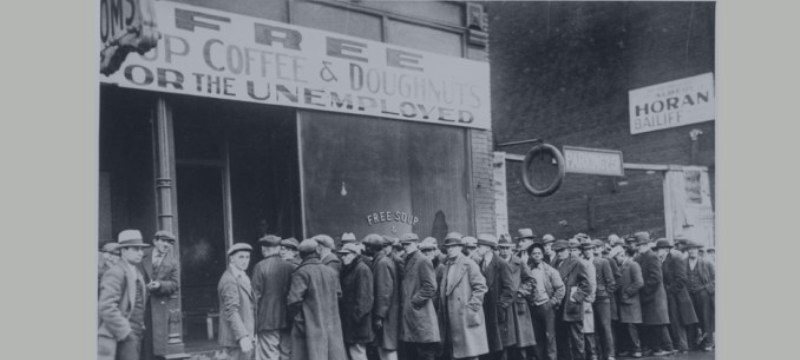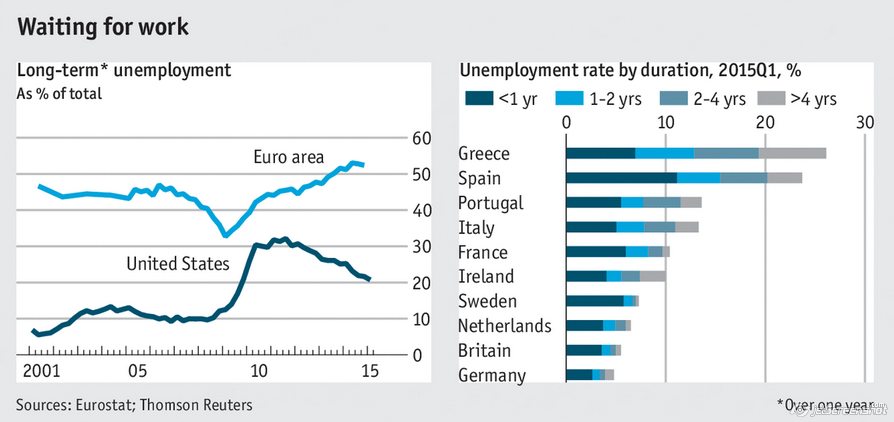
An achievement or a slump? : Why unemployment in the euro region is so high.
2 August 2015, 22:59
1
254
THE LATEST euro-region unemployment figures, discharged on July 31st, fulfill for gently perusing. They demonstrate the general unemployment rate has crawled down to 11.1% from its top of 12.1% in April 2013. Regardless of the uplifting news, another issue as long haul unemployment (for the most part characterized as being out of work for more than 12 months) has risen in the nineteen-part money union. Of the 19m jobless Europeans, more than half have not worked for the most recent year. What's more, more than 15% have not had an occupation for over four years. Unsuprisingly, the issue is most serious in southern Europe where a protacted emergency pushed up general unemployment, and with it long haul joblessness. In any case, interestingly the quantity of individuals who have been searching for work for quite a while in America fell when its economy recuperated; the long haul joblessness rate now sits marginally over 20% of the aggregate. So why is it so extreme for Europeans to return to work?
Another figure the unique long haul unemployment rates is a higher occupation turnover in America than in Europe. Numbers from the International Labor Organization, an UN body, propose that somewhere around 2008 and 2012 the likelihood of moving into job inside of the following month was around 7% for Europeans and 12% for Americans. Also, the chances losing your occupation inside of the following month was 0.8% and 1%, separately. The faster stir implies accessible work is spread out among the populace so aptitudes are kept more keen and spirits higher. It is not every single awful new for the euro zone, however. One reason for the varying joblessness rate is really a manifestation of a healthier work advertise in Europe. Unemployment is falling in America incompletely in light of the fact that debilitated specialists are dropping out of the work power. In Europe the inverse is genuine: the workforce has really developed, which pushes up unemployment rates.
Be that as it may, this bodes sick for single money. Long haul unemployment can act naturally maintaining: the more somebody is out of work the harder it is to get back in. Different challenges emerge as well. Fruitfulness rates, effectively falling in Europe, have a tendency to drop off and future can decrease when joblessness rates are high. The issue is not all inclusive however. Denmark and Germany have kept both long haul and general unemployment low through occupation preparing projects, adaptable work laws and instruction. Southern European nations, where the issue is most exceedingly awful, ought to search north for motivation. https://www.mql5.com/en/signals/120434#!tab=history

Another figure the unique long haul unemployment rates is a higher occupation turnover in America than in Europe. Numbers from the International Labor Organization, an UN body, propose that somewhere around 2008 and 2012 the likelihood of moving into job inside of the following month was around 7% for Europeans and 12% for Americans. Also, the chances losing your occupation inside of the following month was 0.8% and 1%, separately. The faster stir implies accessible work is spread out among the populace so aptitudes are kept more keen and spirits higher. It is not every single awful new for the euro zone, however. One reason for the varying joblessness rate is really a manifestation of a healthier work advertise in Europe. Unemployment is falling in America incompletely in light of the fact that debilitated specialists are dropping out of the work power. In Europe the inverse is genuine: the workforce has really developed, which pushes up unemployment rates.
Be that as it may, this bodes sick for single money. Long haul unemployment can act naturally maintaining: the more somebody is out of work the harder it is to get back in. Different challenges emerge as well. Fruitfulness rates, effectively falling in Europe, have a tendency to drop off and future can decrease when joblessness rates are high. The issue is not all inclusive however. Denmark and Germany have kept both long haul and general unemployment low through occupation preparing projects, adaptable work laws and instruction. Southern European nations, where the issue is most exceedingly awful, ought to search north for motivation. https://www.mql5.com/en/signals/120434#!tab=history


